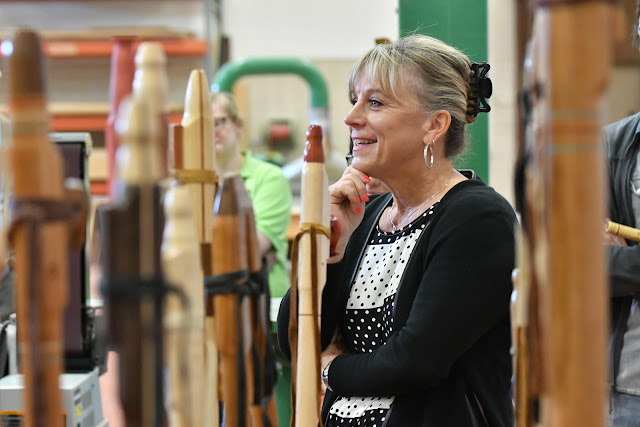Matt Valdez plays a flute he made in Oscar Anderson's Birth of a Flute class.
The cacophony of saws, drill presses and the deafening drone
of a thickness planer quiets, and the mesmerizing notes of Matt Valdez’s flute playing
echo throughout the big room with high ceilings and natural light pouring into
Oscar Anderson’s Birth of a Flute class. Instantly the atmosphere in the space changes – about 16 busy people suddenly are still, quiet, transformed by the soothing
sound, the sense of calm.
Valdez, 22, started with just a piece of blonde-colored wood.
Over many hours he used multiple tools, his imagination, decorative inlay and a
blue leather strap to fashion the flute from scratch. When he is finished
playing, there is a pause of people finishing a sedative thought or relishing a
feeling they found wherever it is they went in their heads while Valdez played
before everyone applauds.
Oscar Anderson helps a student in his Birth of a Flute class.
On a sunny spring morning in April, Valdez played for Salt
Lake Community College President Deneece Huftalin, invited to visit the class
and accept the gift of a flute made by Anderson, who encouraged her to play.
After about a minute of instruction, Huftalin blew into her new flute, adorned
with a hand-carved Bruin bear. Anderson, who has been teaching young students
and retirees how to make flutes for five years, immediately recognized
Huftalin’s excitement when she finished.
“At times I wish I had a camera,” Anderson says. “To see
them play the flute for the first time, the flute that they made, the reaction
is, man, just amazing. That’s the one thing I like, to see students find
something they enjoy that is rewarding for them. It’s well worth it for me.”
Birth of a Flute instructor Oscar Anderson looks on as SLCC President Deneece G. Huftalin reacts after playing for the first time a flute he made for her.
The draw to Anderson’s class, which counts for three credits
as a general education fine arts requirement, is similar for Valdez as it is the
other students in the room. They love working with their hands, taking a piece
of walnut, maple, poplar, cherry or other variety from about 20 different kinds
of wood and making it into a musical instrument – and then actually playing
what often ends up looking more like a work of art. Students are required to
make, tune and play the flutes.
Laurie Maxfield’s own sons made fun of him when
he started the class. Now, however, they and others in his family clamor for
the flutes he gives away, but only to people “who genuinely, sincerely want
one,” he says. Whether the style of flute playing Valdez displayed is for humans or even animals, the effect is generally the same – prevailing peacefulness.
Laurie Maxfield and some of the flutes (foreground) he has made.
Marsha McBride is one of many senior citizens who take the
opportunity to audit Anderson’s class, which means they take it for free and do
not receive a grade. This is McBride’s fourth year taking the class each
semester. While she uses her guitar skills to play for older residents at a
memory care facility “to help them remember,” she plays the flute for patients
in a hospital setting to help calm them down. “I love the sound,” she says
about the flute. “I play just about every day.” On a sleepless night, she’ll
wake up, play the flute and note how it even lulls her dogs – and her – to
sleep. She also raises goats, and when she takes them to a fair, where they get
stressed in an unfamiliar environment, her flute playing puts them at ease.
Marsha McBride plays for fellow students and SLCC President Deneece G. Huftalin.
Perhaps most striking about what happens to the flutes made
in Anderson’s class, or where they’re played and for whom or what, comes from
student John Baker, who has audited the course for the past three years. For
Baker, it all started because he liked the sound of the flute, had time on his
hands as a retired auto mechanic, and decided it would be fun to actually make
flutes. Baker, who served stateside as a tank mechanic during the Vietnam War,
has made more than 100 flutes – and most of them he gives away to veterans with
PTSD. “They learn how to play,” Baker says. “It’s really relaxing when you
play. It just kind of changes their mindset, gets them thinking so they don’t
commit suicide. I like that, so, I just keep making them and giving them away.”
John Baker works on his latest creation in the Birth of a Flute class.
Birth of a Flute class is as much therapy for Anderson’s
students, the recipients of flutes as gifts and for the people who either play
them or hear them as it is for him to teach the course, which he offers twice a
day and into the evening on Tuesdays and Thursdays. “When the second class ends
on Thursday,” he says, “I can hardly wait for next Tuesday.”










